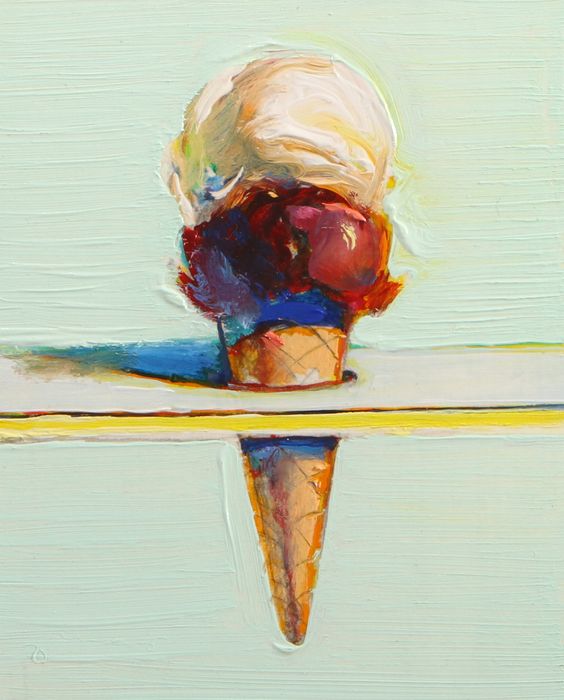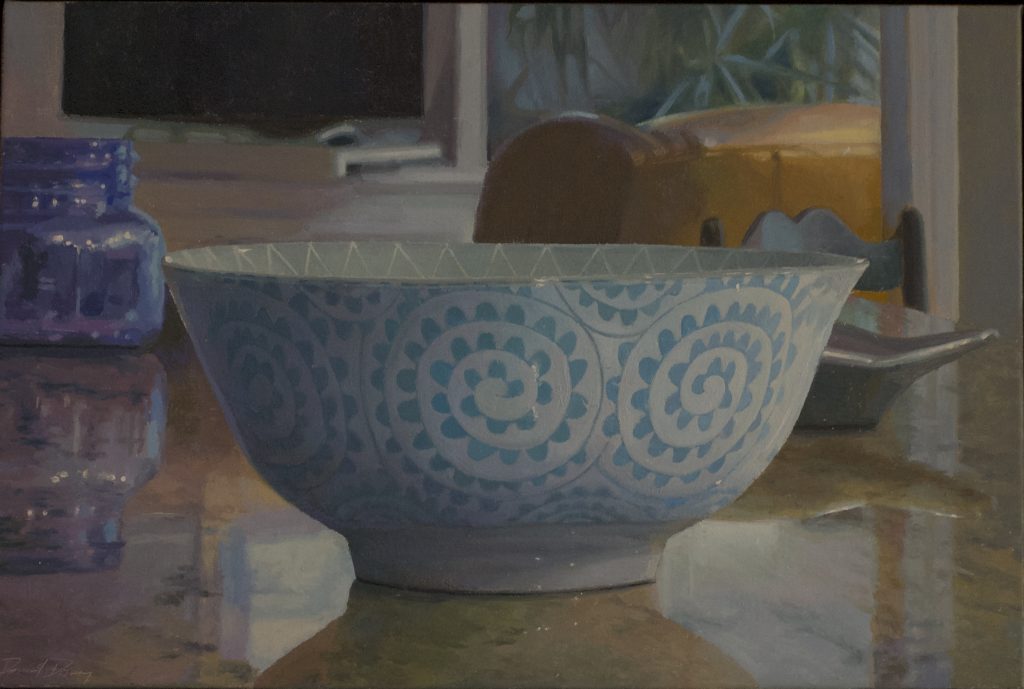June 29th, 2017 by dave dorsey

Two Flavors (Ice Cream Cone), Wayne Thiebaud 2003
I’ve often talked with Bill Santelli about having personal, felt rules, a set of boundaries for how I paint, which create a skeleton of principles around which to make a picture I want to see–which is my first rule, actually, to paint only what I really want to look at, with almost no other consideration. It’s odd, but I can stray from this rule so easily, for one reason or another, without quite being aware how I’m gradually drifting from the delight of the true path. For a while, Bill tended to push back whenever I asserted this and then began to understand what I meant. This was no surprise since his work operates so obviously in accord with what I was saying; I think it was just that he bristled at the onerous associations he had with the word “rules.” Today, I heard the same kind of idea expressed in an interview on All Songs Considered, put into our larger nihilistic, postmodern predicament of having the license to do anything at all and call it art. It was a comment during an interview with the members of Phoenix in a discussion of the French band’s new album, Ti Amo:
The issue is that there are no more limits, in terms of music. Everything is possible. Most of our time we spend in the studio we spend it to create a frame, just to have . . . limits, so we have something coherent in the end.
All of this seems related to Kandinsky’s idea of “inner necessity,” the desire that impels you to make art in a certain, individual way–and the long search to come upon that feeling of necessity. To discover that internal compass, Phoenix will come up with a single image, like a high concept for a movie, around which to create an album. I loved hearing how the spirit of the new Phoenix album, the aesthetic of its overall sound, was centered on the gestalt, the feel, of ice cream. There was something so Thiebaud about that, to embrace that spirit, especially in Paris, of a particular kind of lush pleasure as a guiding aesthetic for a new album in this era of political vitriol and spurts of terrorist violence. It struck me as a radical affirmation of joy in art, for its own sake–like Matisse cutouts or Agnes Martin’s glowing stripes. That’s a delight to the ears of this painter who continues to paint his share of confection and candy.
We could not have released this kind of record in a period of relative happiness. We needed the darkness to come up with this naive and joyful music. We didn’t control it. It’s just what happened. We write music not really knowing what we’re doing, but when it’s done, we realize . . . we have a safe harbor for ourselves. We have hope. It’s uncontrolled.”
Those words almost sum up what I expect and desire from the unknowing act of painting, naive and joyful and willfully ignorant of whatever others think painting needs to be–how “important” it should strive to make itself–in order for the work, when it’s done, to be exactly what I want to see, even if I’m the only one who’s looking.
June 26th, 2017 by dave dorsey

Spiral Bowl with Flat Screen, oil on linen, 16″ x 24″
I’ll be showing Spiral Bowl with Flat Screen at Xavier University Art Gallery’s “Art at the X” from Aug. 25 through Sept. 22. It’s been a number of years since I’ve shown there, and I’m happy to be joining the exhibition again.
June 13th, 2017 by dave dorsey

The past two years have been a desultory mix of so many obligations that it has been nearly impossible to hew to a daily painting discipline. Typically, I’ve enjoyed two months of fairly uninterrupted work and then faced a month when I might have only a few days available for painting–earning some money as a writer, putting in time as a caregiver for my parents, working on our house, visiting my kids in California. As of this June, though, I’ve been able to paint every day and should be able to stick with this schedule into the foreseeable future, with only some short breaks here and there. It’s put me in a much better mood, in general, though that’s tempered by the fact that I’ve reached a point where I’m more critical of the work I’m doing, as I do it. I keep wrestling with a specter of what I recognize as a hyper-sensitive discouragement about results, when the results are actually perfectly fine because what I’m doing and seeing in the work is part of the evolution, the path. Ironically, I feel as if I’m at a threshold where my methods and skills are such that I can reliably do certain things now that weren’t possible before, so I have to fight an impatience that arises when I’m not surprised by what I’m doing. (I’m still struggling as I go, facing uncertainties, but it’s more within a broader range of confidence, so my success at this or that doesn’t impress me as much.) I need to be patient and do what I know how to do for a while, consolidate what I’ve learned about how to paint, in order to build a body of work over the next couple years–which means I have to fight the impatient urge to push past this stage into something a little bolder. More on that later.
Meanwhile, in an email alert from Open Culture, I learned that I can listen to hours of Joseph Campbell lectures for free now on Spotify. Quelle pleasant surprise. I immediately started listening to his lectures at Cooper Union in the late 60s, and after only a few minutes Campbell got right to the heart of the matter and confirmed that I will have some pleasant hours ahead of me:
One of the problems man has to face is reconciling himself to the problem of his own existence, and this is the first function of mythology is that reconciliation of consciousness with the mystery of being, not criticizing it. Shakespeare and his definition of art where he says, art (or the art of acting,) holds the mirror up to nature. It is a perfect definition I would say of the first function of mythology. When you hold a mirror up to your self, your consciousness becomes aware of its support, what it is that is supporting it. You may be shocked with what you see; or you may be pleased that you become aware of yourself, your consciousness becomes aware of that darkness, that Being which came into being out of darkness and which is its own support. The first function then of a mythology is the reconciliation of consciousness to the foundations of being and the realization of their mystery as something that consciousness is not going to be able to criticize, not even going to be able to elucidate, not even going to be able to name. It is something beyond naming, beyond all definitions, and when that is lost one loses the sense of awe, which Goethe calls the best thing in man. One loses the sense of gratitude for one’s privilege of having a center of consciousness aware of these things.


